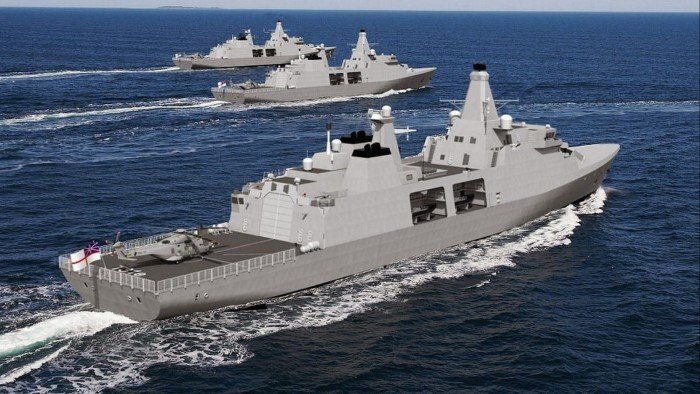Unlock the Editor’s Digest for free
Roula Khalaf, Editor of the FT, selects her favourite stories in this weekly newsletter.
The UK is in advanced talks to build warships for Denmark and Sweden, in a big potential boost to Scottish shipbuilders and the wider British defence industry.
The discussions, confirmed by people familiar with the talks, follow the announcement on Sunday of the UK’s largest ever warship export deal, with Norway.
They also come as Britain deepens military alliances with Scandinavia to counter Russia in the Arctic and north Atlantic, and as US President Donald Trump’s warnings over American security guarantees for Europe boost the attractiveness of buying weapons from European allies.
Sir Keir Starmer’s government has touted the defence sector as a pillar of its plan to boost the UK’s economic growth, and further warship export deals will be welcomed in Whitehall.
One of the people briefed on the talks said an agreement between London and Copenhagen was “very close, almost nailed on”.
Talks with Sweden were “very positive” but more complex because Stockholm was negotiating a range of UK options while also considering a rival offer from France, they added.
The discussions are centred on FTSE 100 defence group Babcock International producing Type-31 frigates at Rosyth in Scotland for Denmark and Sweden.
A Danish deal for three Type-31 “Arrowhead 140” frigates is expected to be announced this month.
Denmark may look to build additional Type-31 frigates domestically after the initial order, one of the people familiar with the talks said.
Sweden is looking at placing orders for four Type 31 frigates. Stockholm’s decision is due by the end of the year.
The Type-31 frigate is the UK’s new all-purpose warship. The Royal Navy is expected to take delivery of five over the coming years to help replace its ageing Type-21 frigates. In 2023 the average production cost of each Type-31 frigate was £250mn, according to the British government.
Troels Lund Poulsen, Danish defence minister, on Tuesday said he wanted to co-operate with an international partner on building frigates, eventually with some production in Denmark.
“This can be done in many different ways, but what is clear to me is that Denmark cannot do it alone,” he told the Berlingske newspaper.
Babcock is in talks to build Luleå-class corvettes at Rosyth for Sweden under a joint venture with Saab © SAAB
Babcock is also in discussions to build Luleå-class corvettes at Rosyth for Sweden under a joint venture with Saab.
The two defence contractors agreed a joint venture last year to work on designing new corvette-class warships, but the talks are the first strong indication of an advancing collaboration.
Babcock said it was “working on potential opportunities for the design and build of frigates for Denmark, and also, with our partner Saab, for the Swedish navy”.
The UK Ministry of Defence said it was “committed” to supporting Babcock in negotiations.
“The Type-31 programme continues to attract significant interest from potential international partners, underlining the strength of the UK defence industry and ship building capability,” it added.
The potential UK deal with Sweden could still be scuppered by France, according to people familiar with the talks, after Paris agreed a defence road map with Stockholm in June to deepen co-operation. However, the final decision lies with Sweden’s independent procurement agency.
Stockholm said it hoped a decision would be taken in the coming months but declined to comment on the specifics of any bids. The Danish government did not immediately respond to a request for comment.
The Danish and Swedish deals, if concluded, are likely to provide a big boost for Babcock’s dockyard in Rosyth, on the Firth of Forth.
Graeme Downie, Labour MP for Dunfermline and Dollar, home to Rosyth, said: “Scandinavian countries are key defence partners for the UK . . . and this would further strengthen and deepen those relationships as we work to deter Russian aggression.”
Under the deal with Norway, five submarine-hunter Type-26 frigates will primarily be built in Glasgow by BAE Systems. The company’s order book for its site in Scotland’s largest city is now expected to be full for the next 10 years.
Defence secretary John Healey welcomed the deal at the weekend, saying it confirmed “Britain’s defence industry as world-leading” and strengthened the alliance between London and Oslo.
Northern European countries are in a critical position to protect against Russian submarine activity in the Arctic and north Atlantic: an area on which the Trump administration has encouraged Nato allies in Europe to focus as the US turns its military attention towards countering China.
Sweden became the 32nd member of Nato last year, motivated by Russia’s full-scale invasion of Ukraine in 2022, while Denmark has been a member since the alliance’s inception.
